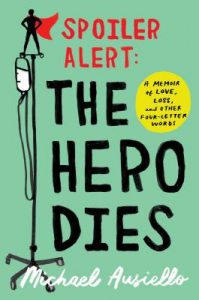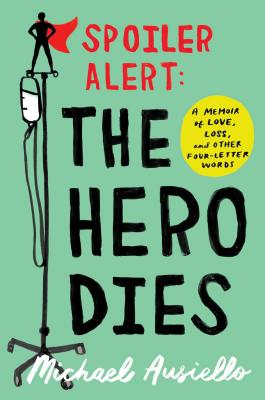 Spoiler Alert: The Hero Dies
Spoiler Alert: The Hero Dies
by Michael Ausiello
Atria. 320 pages, $26.
WHEN MICHAEL AUSIELLO spotted Christopher “Kit” Cowan at a New York event for gay athletes, it was a match made in Manhattan, but there is no happy ending to this boy-meets-boy love story. To say so is not to ruin anything for the reader. The author reveals the unhappy ending to this memoir in its very title, Spoiler Alert: The Hero Dies.
From the beginning of their relationship and a banter-filled, flirty first date that almost ended in disaster, Ausiello was smitten. Kit was a tall, bespectacled, sexy nerd who really knew how to kiss, and the attraction was absolutely there. And yet, even from that first date, it was obvious that there were many differences between them, including a wide gulf in childhood experience and basic personality. Kit had enjoyed a supportive family growing up and was somewhat introspective, while Michael had been bullied and fat-shamed as a child and was prone to depression and anxiety. Michael admired Kit’s style in decorating and dress; he recalls with more than a little humor at how Kit was dismayed by his Smurf-filled home. Still, their yin and yang meshed, and they went beyond kissing, on to bed, and all the way to saying “olive juice” (as Ausiello euphemizes the “I love you” declaration). They called one another cute nicknames, and they adopted a cat—all of which may sound like any typical romance, though the lovers found themselves mostly incapable of living together, choosing to keep separate residences, a situation that led them into couples’ counseling.
In the end they did live together, but that “end” did not last long. A little more than a decade after their love-at-first-sight meeting, Kit, who’d been having intestinal problems for months, was finally driven by the pain to consult a doctor. The diagnosis wasn’t good: he had a fist-sized neuroendocrine tumor in his rectum, which was rare but would, they were initially told, respond well to treatment. All hope was abandoned, however, when subsequent opinions indicated that the cancer was much more aggressive than first thought. His diagnosis gave him less than a year to live, which affected Ausiello in a special way. When he was a child, he had lost his beloved mother to cancer, and he remembered those days of decline and death all too keenly.
Still, of course, he rallied for the man he loved, who became his husband in the midst of diagnosis and before treatment—nuptials fondly remembered, complete with honeymoon. As for the rest of Kit’s illness and death, readers get a hard look at what happened, told with thin humor, as if Ausiello is attempting to protect everyone from the horror of illness and loss. Beware, however, that despite the often funny or ironic tone—one that’s never angry or mean-spirited—there is finally no protection from the details of suffering from bowel ailments and the side-effects of chemotherapy. Thankfully, despite a sad ending that readers know is coming, we also see a transition from anxiety to strength on Ausiello’s part, and we’re left with the image of an author who is on the mend.
________________________________________________________
Terri Schlichenmeyer is a freelance writer based in Wisconsin.





